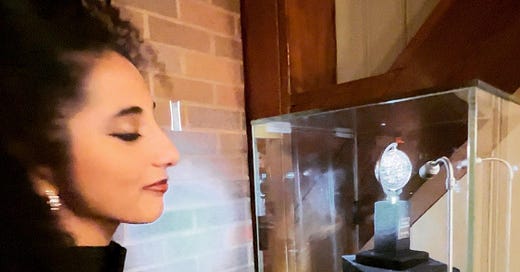You probably have a classic book you know you were supposed to have read and you simply have not read it yet.
I have been so embarrassed to admit I have not read The Great Gatsby. I abandoned it - pitifully- about three chapters in for some mystery series that had me gripped at the time.
My English class opted out of it in favor of the Pulitzer-winning book by Robert Penn Warren, All The King’s Men. It was a thick book that traced the rise and fall of a country hick to power and might in the Depression-era South. Written in the forties, it had similar themes in connection to John Fitzgerald’s Jay Gatsby, who out of seemingly thin air invents a life and narrative that has very real economic and social repercussions.
I saw the musical of The Great Gatsby last weekend (and the regional Tony that the Papermill Playhouse had bagged) and just decided to own my ignorance with anyone who asked. I have realized I learn more that way, committing to honesty.
This version of this story - sung and danced- has been criticized for not knowing what it wants to be. What I saw on stage was a commitment to decentralizing the protagonist Nick Carraway, and exploring the inner workings of all the people at the greatest party ever thrown. Musicals have the power to cut to the chase, with the characters singing what’s in their minds and in their hearts right in front of us. We get to be in their heads, in a way that is less distant than a narrator. The male narrator is puzzling over what the women in this social setting might feel or think, in the musical the women themselves tell us. Nick might muse over the feelings of a lower-class man who has been ripped off in ten thousand different ways by an unjust class system, but on stage, we know exactly what will drive this man to the last, horrifying scene of his.
The book for this adaptation was written by Kait Kerrigan. That matters. It helped drive home Michael Stotts’ (director) vision for this piece that went beyond the limitations of Fitzgerald’s views on women and gave free rein for the artistic team to play with the material Fitzgerald gave us. Each character had a chance to showcase the complexity of their choices and decisions in a society world driven by greed, money, love, and lust. The justifications for their power struggles, lies, and grievances had a chance to further connect with a diverse audience. It was truly not a bad way to meet these people.
There are classic books that have been prioritized as Great American Literature to the point of edging out all others. The Great Gatsby is one of them! This rightfully makes people feel some type of way. In your high school experience, how many of the greats and classics assigned to you were written by women? Or people of color? What countries did they reprsent? This is not to hit some diversity metric or live up to some random anarchist’s vision of schooling. It’s simply about learning from the world we live in and the people around us. The majority of us learned how to see the world through the eyes of men who hit the social jackpot of privilege. Their voices, their vision, and their version of every story have been prioritized in almost every sphere that matters. Their voices and perspectives are important and necessary for us to understand.
Many of us are waking up to the reality that who tells any story matters, and it actually has the power to change the story itself. And yet there is the warning that to completely rid the shelves of the stories and the limited, fallible perspectives that built the lens by which we see the world will make us weaker to the power those narratives still hold. The worth of a woman? What is owed to people with less capital? Who pays for the sins of the rich? The ability to hold up and face an old story, with old answers, and look at it anew from different people’s positions is a superpower in a society that has denigrated rigorous historical study.
We should keep all the books by dead white guys. We should read them and really study them. And then we should ask ourselves to think about the breadth and length of their vision. We should ask it to account for itself in this time and year. And then we should make a choice, as to what extent their stories’ power should exert over the one we have the privilege of telling in our time, in our place, right now.




It's unfortunate that when people do actually question these perspectives in a public setting, they're often met with hostility, labeled "woke," and misunderstood as a left wing extremist instead of a person just challenging people to be more discerning about things. I came across your TikTok, which led me here. Interesting stuff.